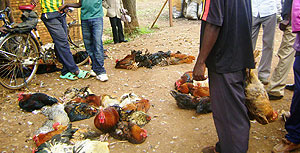Many people in our communities are less considerate about animal rights. This is further worsened by the absence of a clear constitutional law that prohibits the torture of animals. Animals transported to markets and slaughtering houses are carried in a torturous manner that is inflicts extreme pain. The Universal Declaration of Human Rights (UDHR), signed by the United Nations General Assembly on December 10th 1948, emphasized the protection of animals calling for an end to “exploitation or oppression in the name of science or sport, or for use as food, for commercial profit or for other human ends”.


Many people in our communities are less considerate about animal rights. This is further worsened by the absence of a clear constitutional law that prohibits the torture of animals.
Animals transported to markets and slaughtering houses are carried in a torturous manner that is inflicts extreme pain.
The Universal Declaration of Human Rights (UDHR), signed by the United Nations General Assembly on December 10th 1948, emphasized the protection of animals calling for an end to "exploitation or oppression in the name of science or sport, or for use as food, for commercial profit or for other human ends”.
The merciless transportation of cattle on Lorries with their necks hanging and legs well above the floor, are not an unsual scene in Rwanda.
"This is how we carry them. We try to tie them well, but there are those stubborn ones that cannot stay in one place, and get injured. They sometimes die…there’s nothing much you can do,” said Richard Rutagengwa, a cattle transporter from Nyagatare District.
Lorries are filled to capacity and one man is left behind the truck to lift up any animals that fall. But this is an unrealistic demand from a single man, who can hardly lift a leg of a cow.
Peter Mutimura, 32, does such a job.
"How do you expect me to lift a cow of 200 kgs in a speeding vehicle? I agree to do the job well knowing that I won’t do it but they pay me and that is it,” Mutimura said.
However, businessmen are only concerned about the profits they make.
Caludine Nyiramasuhuko, 40, said that he wasn’t interested in animal rights, but how much she gained from each animal.
She says, "cows are cows only when they can earn us profit, but not when they are treated well.”
Nyiramasuhuko added that, "It is funny that people talk about animal rights and some even complain when they see them inconveniently parked in a vehicle.
The more cows I put in a vehicle, the more profit I make. It is a question of reducing costs and maximizing profits and not animal rights,” she said.
Birds
When it comes to chicken, the situation is worse. The rough, aggressive way in which they are strapped, these birds are left with alarming injuries such as bone and joint dislocation and bruises.
Unfortunately, torture is done by adults and this sets a very bad example for the younger generation.
In Nyagatare, there was an incident of some young boys who tortured a hen, by removing its feathers and leaving it to run around, as they chased it up and down.
The children said they considered the hen as a toy, to play with for fun.
"A hen can be used for fun and eating…that is all we know about hens. They are nice birds with beautiful and fine colours to watch and touch. We don’t hate hens,” these children between the ages of 4 and 10 said.
The above children’s behavior tells a lot about what they learn from their parents. They are never told or even shown, how to respect the creatures that human beings feed on.
The fact that people feed on certain animals is not an excuse enough to torture them.
In fact, some schools of thought argue that feeding on a tortured animal, is an insult which is abominable in most cultures around the world.
The government should come outright with an explicit constitutional law that stops animal abuse of any kind.
"There should be a clear statement against the violent approach of animals for all people to read and understand. Anyone who goes against this law should be penalized,” said Laurent Kabanda a university student.
"This will act as a deterrent to the offenses committed against animals,” Kabanda added.
Animal rights and welfare should be made part of the constitution in order to protect animals against cruelty in our society.


